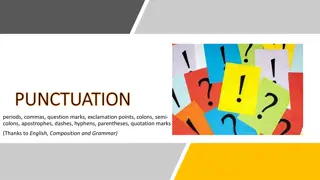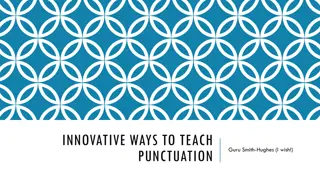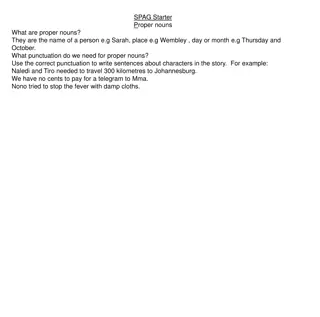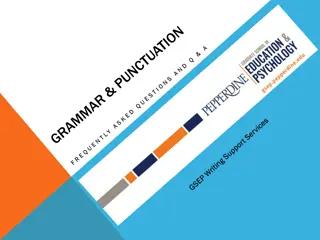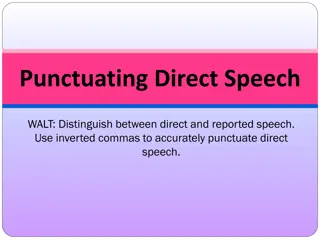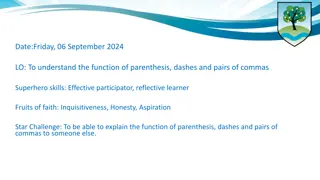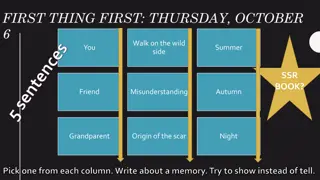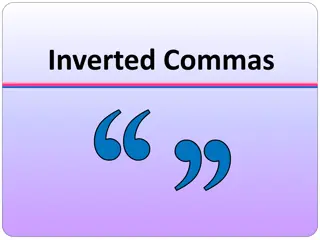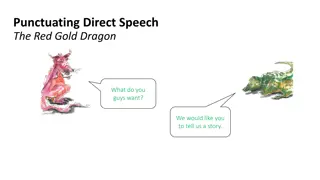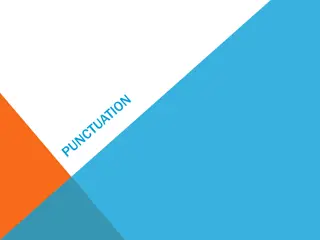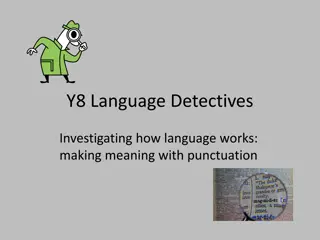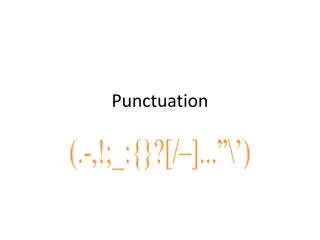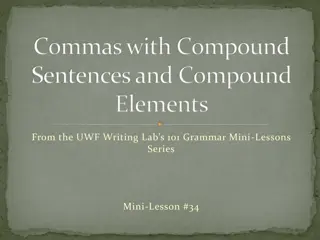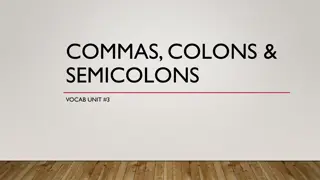Proper Usage of Commas in Punctuation
Learn how to effectively use commas in punctuation. This lesson covers the correct placement of commas with introductory words like "yes" and "no", mild interjections, nouns of address, and appositives. Clear examples are provided for each scenario to enhance understanding.
Download Presentation

Please find below an Image/Link to download the presentation.
The content on the website is provided AS IS for your information and personal use only. It may not be sold, licensed, or shared on other websites without obtaining consent from the author. Download presentation by click this link. If you encounter any issues during the download, it is possible that the publisher has removed the file from their server.
E N D
Presentation Transcript
Lesson 351 Mechanics - Punctuation - Commas Use a comma to separate introductory words yes and no and mild interjections from the sentence that follows them. Examples: Oh, I heard that before. Yes, I will be here. Instructions: Place commas where they are needed. 1. Yes you may leave the room. 2. Of course I won't change my plans. 3. Oh you want to try my patience more. 4. No I didn't see you there. 5. Wow you think that is great.
1. Yes you may leave the room. Yes, you may leave the room. 2. Of course I won't change my plans. Of course, I won't change my plans. 3. Oh you want to try my patience more. Oh, you want to try my patience more. 4. No I didn't see you there. No, I didn't see you there. 5. Wow you think that is great. Wow, you think that is great.
Lesson 352 Mechanics - Punctuation - Commas Use a comma or commas to set off words or phrases used as nouns of address (nominatives of address) Nouns of address are the persons or things to which you are speaking. They may have modifiers and are not related to the rest of the sentence grammatically. You can remove them and a complete sentence remains. Examples: Joe, get over here. Get over here, Joe. Young man, get over here. Instructions: Place commas where they are needed. 1. Did you Susan see him at the meetings? 2. I will call you in the morning Steve. 3. Well Fred it was a pleasure to see you again. 4. Jeanne I don't know what is going on. 5. You should Bill know the answer to that one.
1. Did you Susan see him at the meetings? Did you, Susan, see him at the meetings? 2. I will call you in the morning Steve. I will call you in the morning, Steve. 3. Well Fred it was a pleasure to see you again. Well, Fred, it was a pleasure to see you again. 4. Jeanne I don't know what is going on. Jeanne, I don't know what is going on. 5. You should Bill know the answer to that one. You should, Bill, know the answer to that one.
Lesson 353 Mechanics - Punctuation - Commas Use a comma or commas to set off an appositive if not closely tied to the words it equals or identifies. An appositive is a word or group of words that identifies or renames the noun or pronoun that it follows. Examples: Larry Millward, my best friend, will speak at the meeting. My brother Ken moved to Hawaii. (closely tied, it is needed to identify the word.) Instructions: Place commas where they are needed. 1. Fred James a soldier captured during World War II spoke at the assembly. 2. My sister Elaine died recently. 3. Paul the top student in his class was the valedictorian. 4. Small farming a very important occupation is disappearing. 5. We rode all day on Dot a very old and gentle horse.
1. Fred James a soldier captured during World War II spoke at the assembly. Fred James, a soldier captured during World War II, spoke at the assembly. 2. My sister Elaine died recently. no commas needed (It is closely tied, but one could take Elaine as a noun of address if you don't know her as the sister.) 3. Paul the top student in his class was the valedictorian. Paul, the top student in his class, was the valedictorian. 4. Small farming a very important occupation is disappearing. Small farming, a very important occupation, is disappearing. 5. We rode all day on Dot a very old and gentle horse. We rode all day on Dot, a very old and gentle horse.
Lesson 354 Mechanics - Punctuation - Commas Use a comma to separate co-ordinate adjectives (adjectives that appear in sequence with one another to modify the same noun). Co-ordinate adjectives can be checked to see if a comma is necessary by placing and between them. They will sound smooth and correct with the and. Examples: The warm, sunny day made everyone happy. (warm and sunny sounds smooth) You are a clever little girl. (clever and little doesn't sound smooth) Instructions: Place commas where they are needed. 1. Today was not a clear sunny day. 2. Allison thought she was such a clever little girl. 3. Where did you buy that dashing red car? 4. They say that tomorrow will be a sunny warm day. 5. Your careless inconsiderate behavior could cause you serious problems.
1. Today was not a clear sunny day. Today was not a clear, sunny day. 2. Allison thought she was such a clever little girl. no commas needed 3. Where did you buy that dashing red car? no commas needed 4. They say that tomorrow will be a sunny warm day. They say that tomorrow will be a sunny, warm day. 5. Your careless inconsiderate behavior could cause you serious problems. Your careless, inconsiderate behavior could cause you serious problems.
Lesson 355 Mechanics - Punctuation - Commas Use commas to set off parenthetical expressions. Parenthetical expressions are words inserted in the main sentence but not necessary to the meaning. They interrupt the flow of the sentence. Common expressions used parenthetically are however, of course, on the other hand, in fact, for example, that is, by the way, after all, perhaps, indeed, also, too, nevertheless. These expressions are not always parenthetical. Examples: Lucy, on the other hand, reads little. He knows, perhaps, five answers to the questions. Instructions: Place commas where they are needed. 1. The story that I just told you by the way is true. 2. My plan nevertheless was followed and succeeded. 3. Your plan on the other hand was rejected for good reasons. 4. I might suggest for example that you make some revisions. 5. You in fact should be moved to a different department.
1. The story that I just told you by the way is true. The story that I just told you, by the way, is true. 2. My plan nevertheless was followed and succeeded. My plan, nevertheless, was followed and succeeded. 3. Your plan on the other hand was rejected for good reasons. Your plan, on the other hand, was rejected for good reasons. 4. I might suggest for example that you make some revisions. I might suggest, for example, that you make some revisions. 5. You in fact should be moved to a different department. You, in fact, should be moved to a different department.


